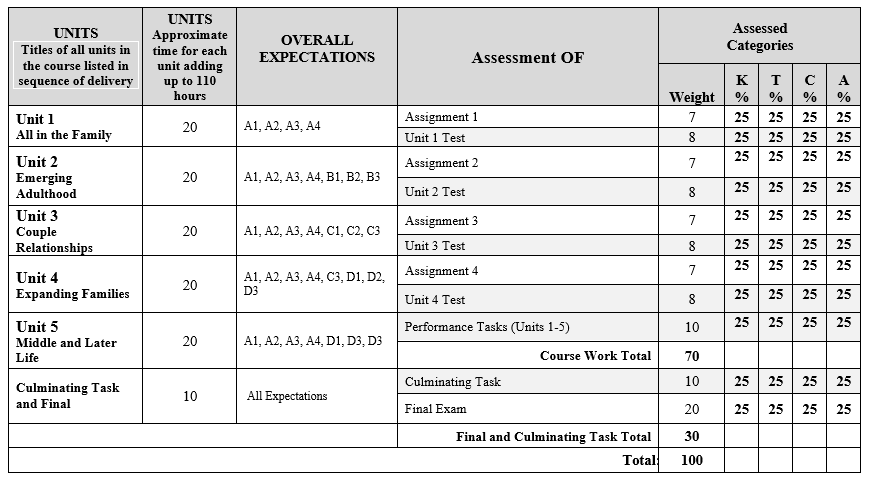Course Description
This course enables students to draw on sociological, psychological, and anthropological theories and research to analyse the development of individuals, intimate relationships, and family and parent-child relationships. Students will focus on issues and challenges facing individuals and families in Canada diverse society. They will develop analytical tools that enable them to assess various factors affecting families and to consider policies and practices intended to support families in Canada. They will develop the investigative skills required to conduct and communicate the results of research on individuals, intimate relationships, and parent-child relationships.
Course Code: HHS4U
Course Name: Families in Canada
Department: Social Science and Humanities
Hours: 110
Credit Value: 1.0
Pre-requisites: Any university or university/college preparation course in social sciences and humanities, English, or Canadian and world studies.
Curriculum Policy Documents:
The Ontario Curriculum, Grade 9 to 12, Social Science and Humanities, 2013 (Revised)
Assessment evaluation and Reporting in Ontario School, First Edition Covering Grade 1-12
Development Date: August 2019
Developed By: Jimmy Chia, B.A.(Hons), M.Ed. B.Ed. (OCT)
Revised By: NA
Revision Date: NA
Overall Curriculum Expectations
Course Content
| Unit | Unit Title | Approx. Duration |
| Unit 1 | All in the Family | 20 hours |
| Unit 2 | Emerging Adulthood | 20 hours |
| Unit 3 | Couple Relationships | 20 hours |
| Unit 4 | Expanding Families | 20 hours |
| Unit 5 | Middle and Later Life | 20 hours |
| Culminating Task and Exam | 10 hours | |
| TOTAL | 110 hours | |
Unit Description
Descriptions taken from:
Holloway, M. Garth Holloway and Jane Witte. (2010). Individuals and Families: Diverse Perspectives. Toronto: McGraw-Hill.
Teaching/Learning Strategies
- Research project
- Independent study
- Oral Presentations
- Debate
- Case summary
- Presentation
- Graphic Organizers
- Computer-Mediated Instruction
- Lectures
- Discussions
- Reading
- Pair Work
- Role Play
- Brainstorming
- Group work
Unit Organization

Assessment Strategies
| For Learning | As Learning | Of Learning |
|
|
|
Evaluation Strategies
Evaluation focuses on student’s achievement of the overall Expectations. Evaluation is basically collected from; observations, conversations, and student products.
Student Products include: tests, exams, rich performance tasks, projects, presentations and /or essays. Students submitting assignments that involved group work will be evaluated individually.
Before making a decision about a student’s final grade, the teacher will consider all the collected evidence of student products. The teacher will also consider that some evidence carries more weight than other evidence.
| Achievement Level | Percentage Mark Range |
| 4+ | 95-100 |
| 4 | 87-94 |
| 4- | 80-86 |
| 3+ | 77-79 |
| 3 | 73-76 |
| 3- | 70-72 |
| Achievement Level | Percentage Mark Range |
| 2+ | 67-69 |
| 2 | 63-66 |
| 2- | 60-62 |
| 1+ | 57-59 |
| 1 | 53-56 |
| 1- | 50-52 |
The final grade will be determines as follows:
- 70% Seventy percent of the grade will be based on evaluation conducted throughout the course.
- 30% Thirty per cent of the grade will be based on a final evaluation and the summative administered at or towards the end of the course.
Evaluation/Assessment Plan
| Unit | Unit Title | Approx. Duration | KICA % Application |
| Unit 1 | All in the Family | 20 hours | 25/25/25/25 |
| Unit 2 | Emerging Adulthood | 20 hours | 25/25/25/25 |
| Unit 3 | Couple Relationships | 20 hours | 25/25/25/25 |
| Unit 4 | Expanding Families | 20 hours | 25/25/25/25 |
| Unit 5 | Middle and Later Life | 20 hours | 25/25/25/25 |
| Culminating Activities (ISU and Final Exam) | 10 hours | 25/25/25/25 | |
| TOTAL | 110 hours | ||
Resources
Holloway, M. Garth Holloway and Jane Witte. (2010). Individuals and Families: Diverse Perspectives. Toronto: McGraw-Hill.
